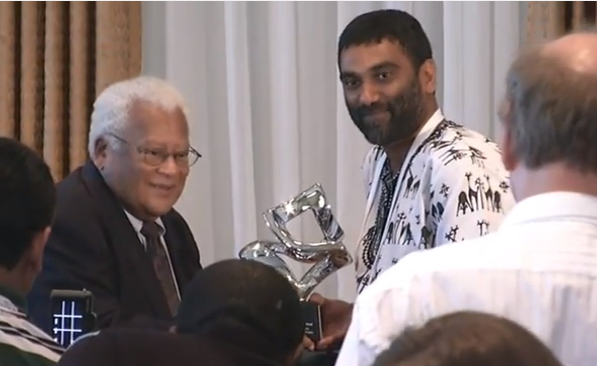
No one gets into activism for the fame and glory. After all, there’s far more to be gained — like say democracy, human rights, environmental justice or simply a place to call home. Nevertheless, even when those things have on occasion been won, it’s still important to recognize the people and hard work it took to get there.
For practitioners and scholars of nonviolent action, there’s but a few honors one can receive. Among them is the James Lawson Award, which was given to four activists this Wednesday: Yorm Bopha, Kumi Naidoo, Jacques Sémelin and Howard Clark.
Named after and presented by the man who led the Nashville lunch counter sit-ins and who Martin Luther King once called “the leading theorist and strategist of nonviolence in the world,” the James Lawson Award ceremony is held during the International Center on Nonviolent Conflict’s week-long Fletcher Summer Institute for the Advanced Study of Nonviolent Conflict at Tufts University.
For the many activists in attendance, representing over 30 countries, the award ceremony is a reminder that their work is supported and celebrated the world over, despite being marginalized or cracked down upon at home. Meanwhile, for the award recipients, it’s an opportunity to acknowledge the people they have struggled alongside.
“Coming here to Boston and receiving the James Lawson Award really has given me a lot of strength,” said Yorm Bopha, a 30-year-old land rights activist from Cambodia, who spent much of the past two years in prison as a result of her efforts to stop the forced eviction of her community by the government. “The recognition has just been wonderful and I look forward to going back and showing the community what we’ve achieved together.”
Greenpeace International head Kumi Naidoo shared a similar sentiment during his acceptance speech, saying, “People like myself, who have had the privilege to have been asked to take a leadership role, must always remember that we stand on the commitment and compassion of hundreds of thousands of individuals who will never be recognized.”
Also overlooked are the people who study civil resistance and try to make known its inner-workings — researchers and academics like French scholar Jacques Semelin, whose work has shown the effectiveness of nonviolent resistance against dictatorships and genocides, and British pacifist Howard Clark, who strongly advanced the field of peace studies through his writing, teaching and antiwar activism. While Semelin was able to accept his award, Clark was not, having died suddenly late last year at the age of 63. Several of his longtime colleagues spoke on his behalf, which led to a stirring moment when social movement scholar Stephen Zunes turned to address Clark’s children, who were in the audience.
“You’ve been hearing a lot stories about the people he impacted and the good work that he did and I’m sure there’s a part of you that’s wondering, ‘Are they just saying this to be nice because he was my father? Was he really that amazing? Was he really that influential?’ Yes, he was.”
This comment seemed to underscore a major theme of the award ceremony: legacy — not only the kind that is appreciated and recorded among peers for posterity, but also a kind that is more fleeting and, in a sense, defines why activists do what they do. Gandhi, as usual, said it best, in a quote that Naidoo used to conclude his acceptance speech. The quote also appears on the gravestone of Naidoo’s close friend, who was killed by the apartheid regime. It says, “We shall pass this world but once. Any good, therefore, that we can do, or any kindness that we can show to our fellow human beings, let us do it now because we may never pass this way again.”
